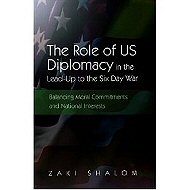The role of US diplomacy in the lead-up to the Six Day War :
balancing moral commitments and national interests
|
|
Zaki Shalom
|

|

The outbreak of the Six Day War was primarily the outcome of tense relations between Israel and Syria during the period that preceded the war. Aware of Israel's overall military superiority, the radical Syrian regime believed that the only way to defeat the "Zionist entity" was by guerrilla warfare, termed "the people's war." The Syrian aim was to keep up continuous limited military strikes against Israel, which they determined would bring about a gradual weakening of the Jewish state's military power and political stability, eventually forcing Israel to acquiesce to Arab demands.
Israel, with the unwavering backing of the United States, retaliated fiercely against the Syrian provocations - the clear policy orientation was the regime's demise. Egypt, presenting itself as the leader of the Arab world, could not remain unresponsive towards this escalating military tension and ignore Syria's political distress. President Nasser therefore decided to send troops into Sinai, followed by a blockade of the Straits of Tiran.
Israel now felt its survival was under threat. Attempts to solve the crisis by diplomatic means failed, and, on June 5, Israel launched a bold strike against Egypt and Syria. The Six Day War not only changed the borders of Israel and redefined its relations with the Arab world, but the impact on the international community still reverberates 40 years on.
Despite a plethora of books on the war, analysis of the intense US-Israel/US-Egypt political and diplomatic activity in the period preceding the war has not been forthcoming to date. Author Zaki Shalom addresses this lacuna by detailing the meetings, exchanges of messages, and internal discussions right up to the outbreak of the war. The book will be essential reading for all those involved in Middle East studies, international relations, and diplomacy and statecraft.
Zaki Shalom is a senior researcher at the Ben-Gurion Research Institute at the Ben-Gurion University, and is also a member of the research staff at the Institute for National Security Studies. He has published extensively on various facets of Israel's defense policy, the Arab-Israeli conflict, the role of the superpowers in the Middle East, and Israel's struggle against Islamic terror. He is the author of Israel's Nuclear Option
|
|
